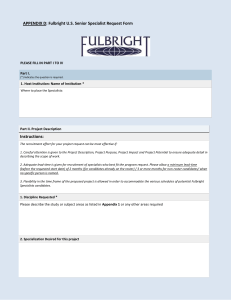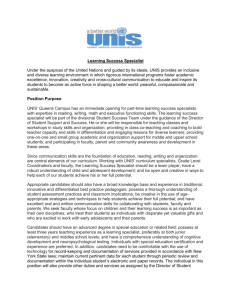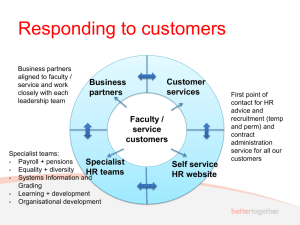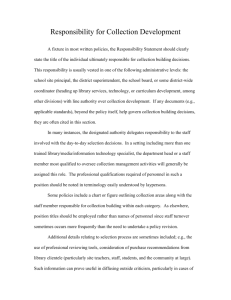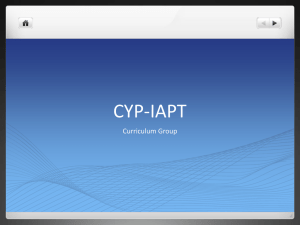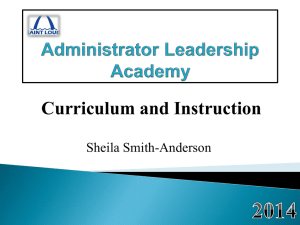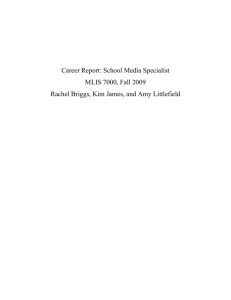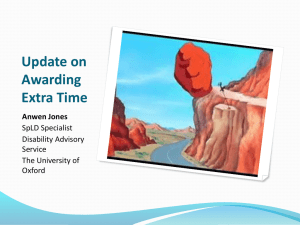Build a Better Mousetrap: Quality Assurance and Call Specialist
advertisement
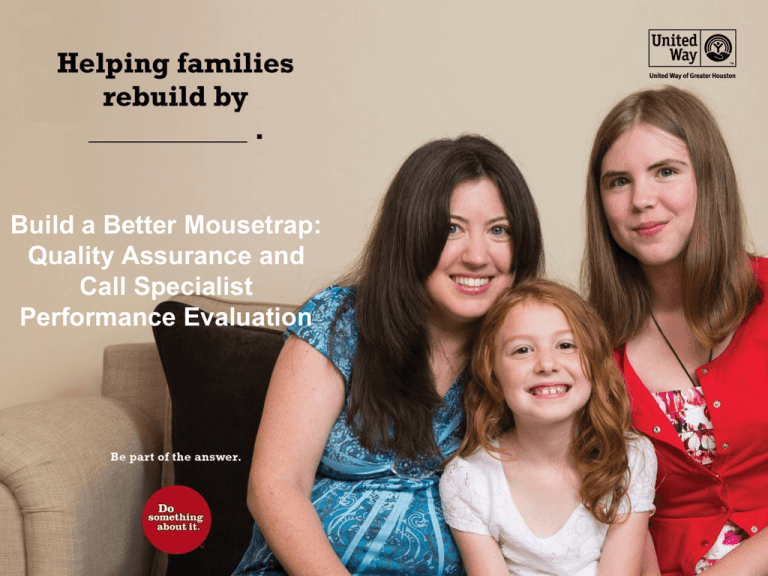
Build a Better Mousetrap: Quality Assurance and Call Specialist Performance Evaluation Workshop Objectives • • • • • Review internal processes & develop a tool for silent monitoring for I&R specialists Review internal processes & develop specialized I&R specialist expectations for time devoted to answering phones, performing off-phone work, completing training & any metrics the center uses. Incorporating call specialist “buy-in” to keep he/she engaged in ongoing work & how the metrics mentioned above are related to performance appraisal process. Develop performance evaluation tool consistent with above mentioned tools to incorporate all needed components to assist with the appraisal process. Assess the tool on annual basis & make adjustments for program changes, processes or changes to the AIRS Standards. Quality Assurance – What is your definition? • Before you can measure something, you have to define it. • This presentation focuses on Q/A & performance evaluation as it relates to the I&R Specialist – AIRS Service Delivery Standards • Q/A cannot be used in a vacuum • So what effect? • Ex. “So I don’t always give the proper greeting? • There must be performance consequences. Best Definition of Q/A • A program for the systematic monitoring and evaluation of the various aspects of a project, service or facility to ensure that standards of quality are being met. • AIRS Service Delivery • NOTE: This same system can be easily adapted for resource specialists. Maybe Staff Evaluation is a Better Term? •AIRS Definition (Glossary – Standards 7.0) •Systematic process •Reviewing work of individual employees (and/or volunteers) according to job description •Provide feedback on performance •Maintain a high level of quality in service delivery, database maintenance and other I&R functions Maybe it’s Both…Q/A & Staff Evaluation. • Call Recording/Silent Monitoring • “Call recording is of most use when reviewing individual… performance.” • Texas I&R Network developed a call monitoring tool based on mystery shopper format used by AIRS. • Programs are able to use this tool or can modify their own We Monitor Our Staff…We’re Done, Right? • No • Call monitoring cannot take the place of giving feedback on ALL elements of a specialist’s work. • Performance evaluation is about more than how a specialist handles calls. • United Way of Greater Houston’s evaluation tool has 2 elements: • What is the job? (Expectations) • How is the job performed? (Monitoring results) Develop a Set of I&R Specialist Expectations • What exactly do you expect your specialists to do on a daily basis? • Here are the ones from the United Way of Greater Houston: • Maintain minimum login time to the Cisco system 85% of their scheduled hours. (NOTE See definition of scheduled hours) • Spend no more than 5% of their time on “Not Ready” • Zero RONA (Rollover on No Answer) tolerance • Schedule follow-ups in accordance with internal procedures. • Keep a Weekly Performance Report Updated and ready for the supervisor to review • Complete Relias Learning within assigned time frame. Expectation Definitions • Scheduled Hours – the # of hours/day and/or week when a specialist is expected to be logged into the phone system and answering calls. • Does not include training time • Does not include any data entry time • Does not include any time devoted to filling out weekly performance report. • Weekly Performance Report – Excel Spreadsheet with calculations built into the tool & all other cells are locked Expectations Translate Into 30% of I&R Specialist Performance Evaluation • Specialists track data in a Weekly Performance Report • Supervisors can import all data in a summary form into a separate spreadsheet • At the time of the Annual Performance Evaluation, supervisor compares specialist score with the measurement scale and enters a score. Call Monitoring Forms Account for 45% of Performance Evaluation • Supervisors review the evaluation forms and assign ratings to the categories by determining if the specialists are keeping current with these skills. • NOTE: Lead Specialists also use the call monitoring forms for mentoring. These completed forms can be used only in partial weight to determine the specialist’s final evaluation. Supervisors must contribute at least 50% of the monitoring forms used for annual evaluation. • Other 2-1-1 Centers in TX perform evening evaluations/mystery shopping. These are also used in this process; however, since the forms vary widely, these are used to help supervisors decide “bubble” situations. Final 25% of Performance Evaluation is for “Other Factors” • Interpersonal skills • Attendance at work (reliable & punctual) • Responsiveness to team needs • Time-Management • Consistently seeking opportunities for growth • Flexible/Willingly accepts tasks outside of job • Properly participates in organizational events Self Assessment • Specialists complete a self-assessment with strong emphasis on understanding of the primary 5 service delivery standards. • Includes areas for improvement • How supervisors can assist with growth/development • Also includes any project a specialist perceives as going “above and beyond” • Self-Assessments are the specialist’s “voice” that is included in the final performance appraisal write-up. Questions? Sandra Ray, CIRS Manager, Information & Referral United Way of Greater Houston 2-1-1 Texas/United Way Helpline 713-685-2469 or IP 52019 sray@unitedwayhouston.org
